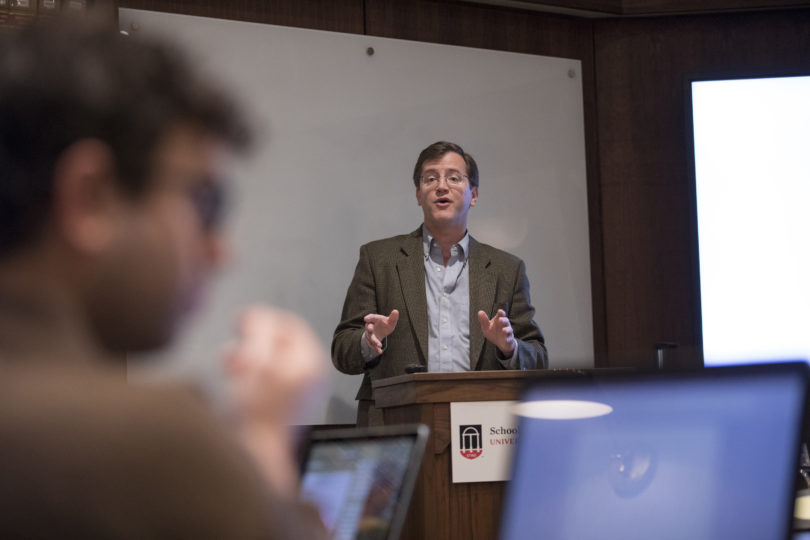Christopher M. Bruner, a professor in the School of Law, says his most rewarding moments as a professor are when his students discover new interests in business law and policy.
Where did you earn degrees and what are your current responsibilities at UGA?
I received an A.B. in English from the University of Michigan, an M.Phil. in English from the University of Oxford and a J.D. from Harvard Law School. I’m currently the Stembler Family Distinguished Professor in Business Law at the UGA School of Law, where I teach subjects related to corporate law and corporate finance in the upper-level business curriculum.
When did you come to UGA and what brought you here?
I practiced corporate law in Boston and then taught at other law schools for several years before arriving at UGA in 2017. The intellectual energy and collegiality of UGA Law were immediately apparent from my first visit, and the institutional commitment to business-related subjects—both domestic and international—was a big draw. Although I’m from Michigan, I grew up in a major public university town much like Athens and instantly felt at home here.
What are your favorite courses and why?
My courses all relate to corporate law and corporate finance, but they vary considerably in their structure and approach to these subjects, and are all fun to teach. “Corporations” is an introduction to the organization and governance of business entities and represents many law students’ first exposure to the world of business, providing an occasion to raise fundamental questions about private enterprise and market structures. “Comparative Corporate Law” builds on this by giving students an opportunity to think and write about how these structures vary in different national contexts. “Corporate Finance” then takes a deeper dive into the legal framework for a wide variety of financial instruments and strategies, while “Deals” helps students develop a toolbox of concepts and skills useful across a range of transactional settings, including through analyses of transactions negotiated by UGA Law alumni now in transactional practice themselves.
What are some highlights of your career at UGA?
I’d say the most rewarding moments for me are when my students discover totally new interests in business law and policy as I experienced myself, having encountered corporate and financial subjects for the first time in law school. More generally, I’d say the highlights have been day-to-day interactions with students, faculty and alumni. Institutions are ultimately about people, and this is an extraordinarily engaged and welcoming community.
How do you describe the scope and impact of your research or scholarship to people outside of your field?
Corporations are among the most consequential economic actors on the planet, and their governance determines how enormous aggregations of wealth and resources will be used. Everyone has a stake in the rules determining their accountability structures, the nature and degree of risk-taking they promote, the sustainability of their operations and whose interests legitimately guide their decision-makers. My scholarship focuses on these and related issues, often in a comparative context.
How does your research or scholarship inspire your teaching, and vice versa?
They’re mutually reinforcing. A new and intriguing research topic might be inspired by a student’s willingness to question foundational dynamics of the field. My teaching also helps me maintain a sense of the whole field, contextualizing research topics that might preoccupy me at any given time. Conversely, then, I’m often able to present course topics more fully by reference to my own research, whether focusing directly on a particular aspect of U.S. law or contrasting our law with approaches taken elsewhere. Even in courses focused on U.S. law, comparative excursions can be effective in revealing implicit policy choices and puncturing the illusion that our own approach to corporate regulation is somehow inevitable.
What do you hope students gain from their classroom experience with you?
Naturally I want my students to leave my classes with a sound grasp of relevant legal doctrine, as well as analytical and professional skills that will serve them well as they embark on their careers. More generally, I hope my students will have gained some insight into the social, political and economic dimensions of corporate law and corporate finance—both the pathologies to which these fields are susceptible and the opportunities they present to contribute to social and economic development.
Describe your ideal student.
Prepared and engaged, open-minded but critical and not afraid to ask questions.
Favorite place to be/thing to do on campus is…
Sitting in my office—thinking, reading, writing, talking with students and faculty colleagues, Skyping with colleagues in my field around the world and reflecting (as I try to do at least briefly each day) on what an extraordinary privilege it is to get to do this work.
Beyond the UGA campus, I like to…
Spend time with my family, travel, watch English Premier League matches, jog around Athens and visit haunts in Normaltown (Sips, Hi-Lo, Ike & Jane).
Community/civic involvement includes….
Over the years, I’ve enjoyed volunteering through our church and (when my son was younger) coaching youth soccer.
Favorite book/movie (and why)?
It’s very difficult to choose. Recently I’ve spent time with the work of writers who blend essay and travelogue—Orhan Pamuk, W.G. Sebald and others. As to movies, “It’s a Wonderful Life” never gets old for me—a poignant reminder that finance is a means, not an end.
The one UGA experience I will always remember will be…
Trying to explain to family and friends in Big Ten country that the SEC really has taken tailgating to another level.
(Originally published Feb. 19, 2019)




